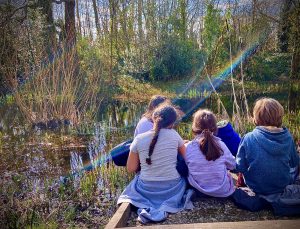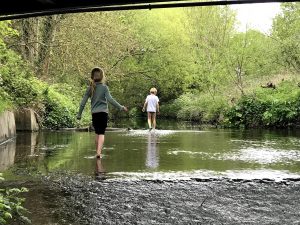By Elena Noseda
 I’ve joined Free We Grow at the beginning of Spring.
I’ve joined Free We Grow at the beginning of Spring.
Trees were naked and so looked the pond, with its clear and still surface reflecting shades of brown and grey with just a few small and timid leaves coming out of its edge.
The air felt sharp on my face, and I very much needed a hot tea every morning, to keep my body warm.
Everything looked asleep, calm and I felt so grounded and pleased to be out working again.
This winter has been a challenging one, with the lockdown in place and all the consequences that this measure has directly or indirectly brought to our lives. Spring, more than ever, has been a messenger of hope and new life.
Today, I stand by the small gate that divides the courtyard from the reserve and I notice how dramatically the space has changed.
It is so green and lavish and indeed full of life.
The pond is visited by ducks, moorhens with their chicks. Blue and red damselflies and new duck weeds have appeared in some corners. Iris have bloomed in a blast of yellow that makes such a happy contrast with the huge amount of green surrounding the flowers.
The air is warm and gentle on the skin and I can’t keep count of the different wildlife encounters I make every time I enter the nature reserve.
I feel that this slow transformation of Dacres Wood has gently accompanied the children’s transition from the online routine to the “back to normal” one.
A change not to be underestimated, given the challenges that each one of us has been through the past year.The weeks have gone fast and we have enjoyed the space in many different ways: running, sitting, singing, chatting, bird watching, but most importantly playing.
That flow of play which I wish all children could enjoy.
A free, meaningful, rich, and dynamic flow where everyone belongs and where creativity and imagination make minds travel away, in fantastic worlds.
I already feel very connected to this nature reserve and each little corner is already linked to wonderful memories.
I think the meadow, in particular, has been a centre of gravity:
- In the meadow we celebrated the Earth Day and my transition from intern to facilitator.
- In the meadow we said goodbye to a child that was starting a new journey abroad.
- In the meadow we got excited at watching the the solar eclipse and again in the meadow we said goodbye to the giant oak that couldn’t live with us anymore and explored the new space left when it was cut down by the tree surgeons (for safety reasons).
The meadow has been the stage of some of the most beautiful moments I could witness and it has revitalised my profound liaison with the idea that has shaped my personal journey: the biophilia hypothesis.
I’ve been told in the past that the word “biophilia” sounds a bit like a medical word, the name of a medicine or something that belongs to the pharmacy shelves.
It is indeed a very scientific word, and it sounds a bit weird (!) but the meaning embeds a much different concept than what the word suggests and it is more related to the web of life than anything else.
The biophilia hypothesis is – the idea that humans possess an innate tendency to seek connections with nature and other forms of life. The term biophilia was used by German-born American psychoanalyst Erich Fromm […] (1973), which described biophilia as “the passionate love of life and of all that is alive.” The term was later used by American biologist Edward O. Wilson in his work Biophilia (1984), which proposed that the tendency of humans to focus on and to affiliate with nature and other life-forms has, in part, a genetic basis.” (Britannica)
Indeed, what I see taking place every day that I spend at Free We Grow, is very much explained in this concept.
It’s pure love for life that flows in and around all of us.
I see children and facilitators exploring together the very articulated essence of existence, in a natural, spontaneous, and fulfilling way.
This, to me, is the most precious learning process we can be exposed to.
That said, there is another important aspect that I want to underline:
what is this, if not a powerful, therapeutic experience we can offer to our children, to help them deal with the crazy ride that this pandemic is putting us all through?
To explain this better, I probably need to introduce a couple of concepts that underpin my point of view: nature connection and belongingness.
I have been advocating for time spent in nature and free play for quite a long time now. There is so much literature about the positive impact of nature on our general wellbeing.
You can easily search online and feel overwhelmed by the many researches available.
In nature, blood pressure drops, and so does cortisol levels, heartbeats stabilises and breathing rate slows down.
In a recent perspective piece, Dr. Alexia Barrable and Anna Touloumakos have argued for the protective and therapeutic potential of nature in relation to ACEs (adverse childhood experiences). Read more.
In a nutshell: the moment we step into a green space, our body starts healing from any stress we have been through.
If this was helpful before the pandemic, I guess you’ll see how this is becoming powerful in Covid times and why being based at Dacres Wood creates the foundations for an exceptional outcome for this project.
But that’s only half the journey through the benefits that the children are exposed to when coming to Dacres Wood.
The other half is represented by another important piece of our human puzzle. Something that has been hardly hit in the past months: relatedness.
Oh yes, humans need to belong!
What I have noticed when I joined Free We Grow was the strong sense of community. It is so authentic and deeply entwined between the children, the facilitators, the families and the directors that it creates a safe and welcoming space for everyone.
Generally, a sense of belonging involves more than simply being acquainted with other people. It is centred on gaining acceptance, and support from members of the group as well as providing the same attention to other members.
This is quite a fascinating topic and if you want, you can look at an interesting study on the subject here: Baumeister and Leary ( 1995).
From a psychological point of view, what Baumeister and Leary point out is that all human beings need a certain minimum quantity of regular, satisfying social interactions.
Belongingness appears to have multiple and strong effects on emotional patterns and on cognitive processes. It develops positive qualities such as empathy, principled moral reasoning, general morality and it might underpin our capacity to identify ourselves with all humanity.
They also argue that belongingness is such a fundamental human motivation that we feel severe consequences for not belonging.
I think that by now you can see where I am going with this.
In such challenging times, it is becoming more and more evident that both nature connection and belongingness play a crucial role in our way to recover from this pandemic.
Finally, here is the thought I want to pencil down in this article:
The space created at Free We Grow not only empowers children through a unique learning process, giving them the freedom to explore this world in a safe and dynamic way, but it’s also offering what humans are now realising is necessary to swim in these deep waters: the opportunity to be blessed by the healing power of a community-based in nature.
